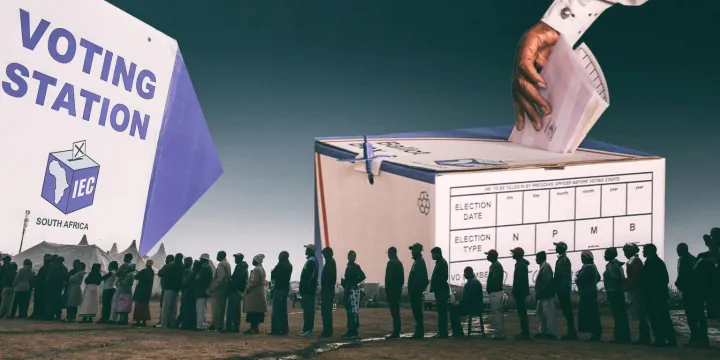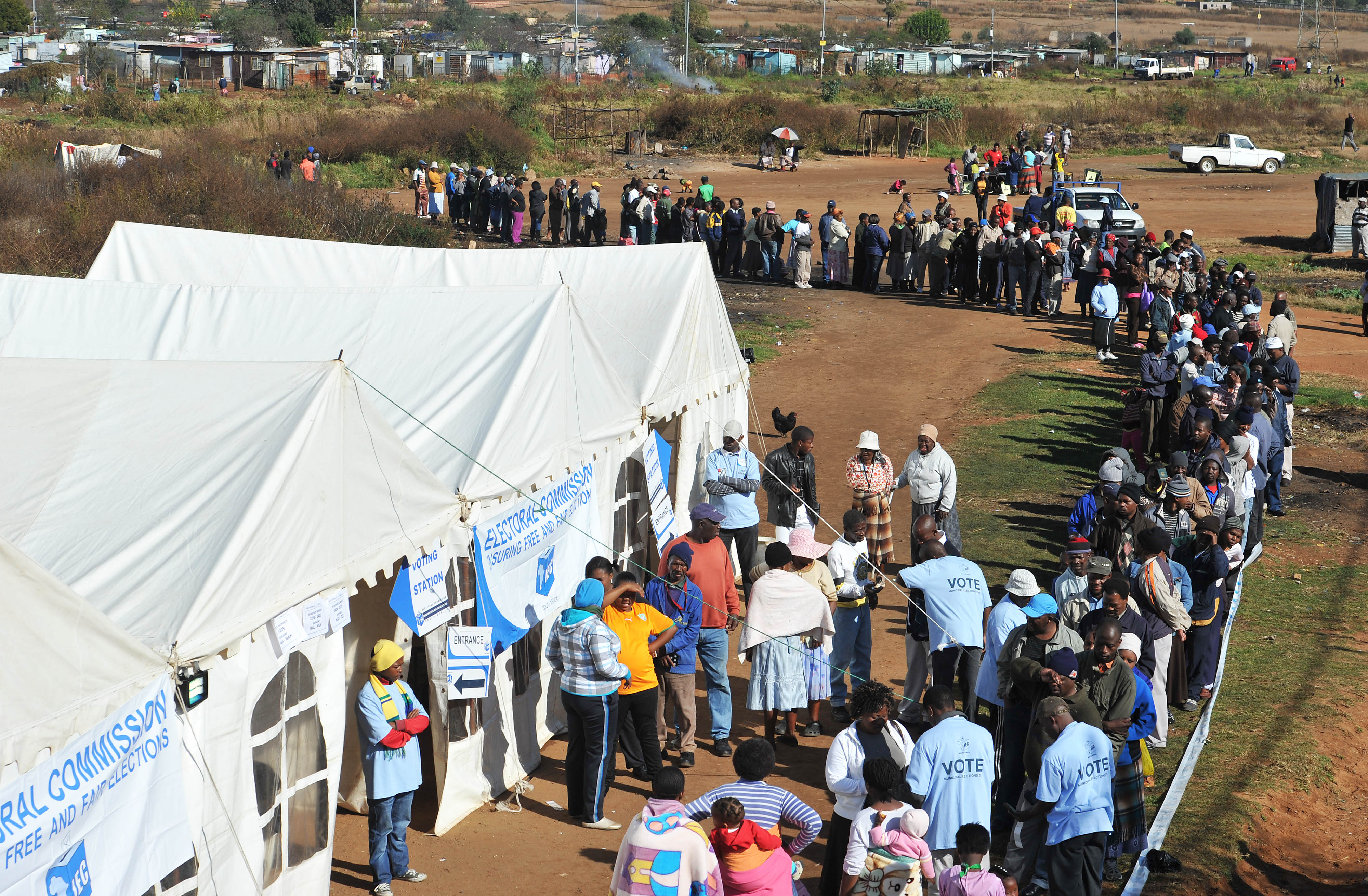ROAD TO 2024 ELECTIONS
Controversial election legislation rushed through Parliament may head to court if proposed 11th-hour talks fail

The ANC is set to use its numbers to push through the Electoral Matters Amendment Bill on Tuesday – if the legislation remains on the day’s order paper. Threats of litigation over the changed funding formula may yet snag the 29 May poll.
Opposition parties in Thursday’s programming committee meeting appealed for discussions among parties to stave off potential legal action over the Electoral Matters Amendment Bill. The legislation controversially changes the funding formula of how political parties and independents represented in legislatures receive allocations from state coffers.
If those talks among chief whips do not happen or are unsuccessful, court challenges against the Electoral Matters Amendment Bill may well unfold. Because that legislation must be in place ahead of the 2024 elections, any delays may impact on the poll.

Residents of the Motsoaledi informal settlement behind Baragwanath Hospital in Johannesburg wait in long queues at a voting station on 18 May 2011 to cast their ballots in municipal elections. (Photo: Gallo Images / Foto24 / Felix Dlangamandla)
While Freedom Front Plus chief whip Corné Mulder on Thursday suggested taking the foot off the pedal over this draft law, ANC chief whip Pemmy Majodina said this was putting the cart before the horse. Any legal challenge should be dealt with separately from parliamentary processes, she said.
“We are working against time here… elections are pronounced,” Majodina said.
Read more in Daily Maverick: Elections 2024
But Mulder’s appeal for discussions was supported by IFP chief whip Narend Singh and UDM chief whip Nqabayomzi Kwankwa, who said: “(I)f the ANC is not willing to hear various opinions on this matter, we are more than willing to challenge this in the courts”.
Parliamentary legal adviser Charmaine van der Merwe told MPs that time pressure meant special measures such as early briefings to the National Council of Provinces (NCOP).
“It (the Bill) impacts on the elections and we understand the urgency,” she said, adding it was difficult to say how litigation would affect elections unless an interdict was issued.
Changing the formula
The Electoral Matters Amendment Bill is needed to bring independent candidates, who can now contest national and provincial elections, into the funding and disclosure regime.
The Electoral Commission of South Africa (IEC) previously told Daily Maverick, “… it would still be in order to have the enactment done any time before the elections”.
But the draft law from Home Affairs Minister Aaron Motsoaledi also included a controversial change to the funding formula for represented political parties and independents to a proportional 90% allocation according to strength and a 10% equitable allocation, or 90:10.
Following a legislative amendment in 2018, those represented in Parliament and in the provincial legislatures receive financial support from state coffers, split into one-third equitable and two-thirds proportional allocations.
This arises from Section 236 of the Constitution: “To enhance multi-party democracy, national legislation must provide for the funding of political parties participating in national and provincial legislature on an equitable and proportional basis”.
Thursday’s programming committee discussion follows the 1 March home affairs committee approval – on the back of ANC numbers – of the Electoral Matters Amendment Bill. The committee report reflects objections from the DA, IFP, ACDP and Freedom Front Plus.
It has been an unusually fast pace in law-making – four months since the draft law was tabled in Parliament to the scheduled vote on 12 March.
In earlier public hearings, the opposition, civil society and others argued against this funding formula change as substantive and new. Or as the Council for the Advancement of the South African Constitution (Casac) put it in its submission:
“The amendment is not a consequential one and there’s no need for it at this stage. It also disadvantages smaller parties… (T)he existing division of funding allocations should be retained and the proposed amendment should be rejected.”
In a rare submission to parliamentary processes, the governing ANC, backed by its alliance partner, Cosatu, argued that the funding formula was for the committee to decide. The IEC agreed.
The ANC, which currently holds the most seats in Parliament and eight of the nine legislatures, wanted 0.25% of what’s available from state coffers for each legislature seat.
Its own calculation showed the biggest party would get the most money – more even than on the 90:10 proportional/equitable formula, which was ultimately approved.
For the Freedom Front Plus chief whip, the changes to the funding formula were problematic, as was the “rush” to pass the Electoral Matters Amendment Bill, as public hearings were truncated.
“There is no way the opposition parties are going to allow the ANC by stealth to try to steal more money,” Mulder told Daily Maverick by voice note.
“We believe this Bill would be unconstitutional. There is strong support from all the opposition parties to take this to court. That will play out sooner rather than later if the ANC persists… to push it [the Bill] through.”
DA MP Adrian Roos had unsuccessfully argued for further public consultations, particularly on the changed funding formula the home affairs committee adopted on 1 March.
Controversial proposal ditched
On the upside, proposals to allow the President to circumvent Parliament in the funding of represented parties and independents, which Casac had described as “a regressive step for executive accountability”, were ditched.
In place remains the current approach that the National Assembly decides by resolution when the President may amend regulations on funding criteria and thresholds. This means Parliament continues to have a say.
On Tuesday 12 March, the Bill is scheduled in the House for a vote if the mooted chief whips’ talks do not materialise or fail. When the ANC – on the back of its numbers – gets this draft legislation approved, it goes to the NCOP, whose delegates sat in the National Assembly committee briefings.
This has shortened, but not annulled, the NCOP deliberation process to pass the legislation without changes so it can reach the President’s in-tray.
If the Electoral Matters Amendment Bill is not signed into law by the President before the elections, or if the threatened litigation unfolds, the 29 May poll remains in jeopardy. DM


















This they can off course rush through. Anything that is of actual importance to the country gets lost in the twilight zone. History will judge these thieving clowns very harshly
There is only one thing that the intelligent person will be focusing on now:
How to get into the shortest queue to cast your vote for the DA.
Masters at thieving I believe we can call the ANC. The greed , arrogance unaccountability should be the calls that unseat them. Otherwise we sacrifice our democratic dreams .
Bob -. March 10th 2024 at 05:36
Somehow reminiscent of the old Afrikaner National government only more corrupt. Is there enough anti-ANC feeling to rid South Africa of the ANC once and for all? Very doubtful.
“Equitable” does not carry the same meaning as “equal”. An argument could even be made that a purely proportional split would be perfectly equitable in the context of party funding, and that section 236 uses two near-synonyms to describe a single concept. As such, I doubt that the proposed party funding split would be ruled as unconstitutional. It seems far more likely that the ConCourt would avoid the spectre of judicial overreach if this matter ended up before them (as it has done in the past).
A more appropriate fight to pick might be how and why Treasury’s annual allocation to the Represented Political Parties Fund has ballooned from less than R167 million in 2021/2022 (roughly the same as the years preceding it) to R342 million in 22/23 to an adjusted appropriation of R850 million in 23/24, and whether this can be justified considering the country’s financial position, using the Promotion of Administrative Justice Act as a basis. It also seems better suited as a hot-button election topic than merely arguing about ratios.
In any case, there is a far better way to “starve the beast” than to spend a fortune on legal fees and possibly/likely losing — push the resources into an election campaign that greatly whittles down the number of parliamentary seats the (current) governing party may claim.